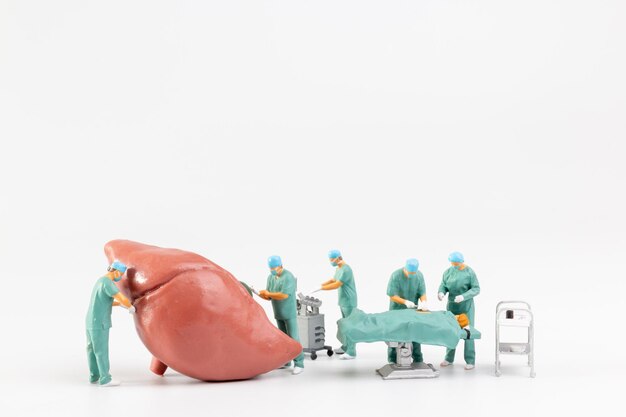Are you considering liver replacement surgery?
As a trusted medical treatment management foundation, we know this decision raises many issues. We’re here to assist. In this article, we will walk you through the benefits, hazards, and vital recovery suggestions related to liver replacement surgery. Liver transplantation, or liver replacement surgery, can save people with end-stage liver disease or acute liver failure. Patients often live longer and better by replacing a sick liver with a healthy one. Understanding the dangers is essential.
Surgery can cause infections, organ rejection, and blood clots. Recovery following liver replacement surgery also needs time and dedication, with post-operative care and lifestyle modifications playing essential roles. This article offers expert advice and practical tips to help you recover from liver replacement surgery. If you or a loved one are considering liver replacement surgery, read about its benefits, risks, and recovery.
Liver Replacement Surgery
Liver replacement surgery comprises the removal of a damaged liver and its replacement with a healthy liver from a donor. This surgery can save patients with severely decreased liver function due to disorders like:
- Acute Liver Failure: A sudden loss of liver function that can occur due to drug toxicity, such as acetaminophen overdose, or viral hepatitis.
- Cirrhosis: Chronic alcohol abuse, viral infections, and fatty liver disease cause cirrhosis.
- Liver Tumors: Cancerous liver tumours must be removed.
- Genetic Disorders: Genetic disorders including Wilson’s disease and hemochromatosis affect liver function.
The Value of Liver Transplant
The liver is essential for digestion, detoxification, and metabolism. When it fails, the body can no longer digest nutrients adequately, resulting in major health consequences. These vital functions can be restored by a liver transplant, improving quality of life and lifespan.
Liver Replacement Surgery Benefits
Liver transplants are essential for severe liver conditions due to their many benefits. Here are some of the major advantages:
- Life Quality Improvement
Many liver replacement patients experience immediate quality of life improvements. Common post-surgery reports:
- Increased Energy: Many people have greater energy and can enjoy their favourite hobbies.
- Better Appetite and Digestion: A healthy liver boosts metabolism, improving appetite and nutrition.
- Longer Life
Liver replacement surgery improves and extends life for many people. According to research:
- Liver transplant recipients have a 90% one-year survival rate and 75% five-year survival rate.
- Long-term health: Many transplant recipients live healthier, more active lives for years.
- Symptom Reversal
A successful liver transplant can lead to the reversal of debilitating symptoms associated with liver disease, including:
- Jaundice: Surgery often cures bilirubin-induced skin and eye yellowing.
- Ascites: Abdominal fluid collection can decrease, enhancing mobility and comfort.
- Resume Regular Activities
Many patients can resume jobs and activities after recuperation, improving their mental and physical health.
Replacement liver surgery risks
Liver replacement surgery has many benefits, but it also has hazards. Important considerations:
- Surgical Risks
Liver transplant surgery, like any major surgery, has risks:
- Excessive bleeding: Excessive bleeding during or after the procedure may require transfusions.
- Infection: Post-surgical infections are a possibility due to the immunosuppressive drugs needed to prevent organ rejection.
- Long-Term Health Risks
Using immunosuppressive drugs to prevent rejection can cause:
- Infection Risk: These drugs weaken the immune system, increasing infection risk.
- Organ Damage: Long-term use can damage organs like the kidneys.
- Problems
Potential complications that can arise from liver transplant surgery include:
- Rejection: The body may reject the transplanted liver, requiring constant monitoring and therapy.
- Bile Duct Issues: Bile leaks and strictures may require medical attention.
- Mental Effect
Liver transplants and chronic illnesses can cause anxiety, despair, and stress. These potential effects must be known by patients and families.
Surgical Liver Replacement Recovery
Liver transplant recovery requires careful supervision and assistance. Here are crucial recuperation tips:
- Take Medical Advice
Following medical advice is essential for recovery. This includes:
- To avoid rejection, take all drugs, including immunosuppressants, as indicated.
- Attending all liver transplant specialist follow-up sessions to check liver function and health.
- Monitor Your Health
Post-transplant health monitoring is crucial. Patients should:
- Know Rejection Signs: Fever, jaundice, or stomach pain may signal rejection or complications.
- Journal your health. Describe symptoms, medication regimens, and health changes to doctors.
- Hydration, Nutrition
Recovery requires a nutritious diet:
- Balanced Diet: Eat fruits, vegetables, whole grains, and lean proteins to heal.
- Hydration: Staying well-hydrated promotes liver function and general health.
- Gradually Resume Activities
After surgery, it’s important to gradually return to normal activities:
- Physical Activity: Start with gentle activities and increase intensity as tolerated, contacting your healthcare staff.
- Avoid Strenuous Activities: Patients should refrain from heavy lifting or high-intensity exercise until cleared by their doctor.
- Emotional support
Recovery requires emotional management:
- Seek Support: Engage with support groups or counselling programs to treat symptoms of anxiety or sadness.
- Communicate: Discuss recovery feelings and needs with family and friends.
Specialists Manage Liver Transplants
Effective liver transplant care demands a comprehensive approach. Specialists help achieve success:
- Transplant liver specialists
Liver transplant specialists evaluate patients, provide pre-operative care, and follow-up after surgery. Expertise includes:
- Evaluation and assessment Assessing liver transplant candidates thoroughly.
- Customized Care Plans: Customizing transplant treatment protocols for each patient.
- Liver Transplant Hospitals
Selection of the right liver transplant hospital is crucial for success. Top liver transplant hospitals offer:
- Comprehensive Care: Access to a full range of services, including surgical teams, transplant coordinators, and support staff.
- Advanced Technology: Modern facilities and technologies improve patient safety and surgical success.
- Ongoing Education and Support
After surgery, transplant treatment continues:
- Education Programs: Many transplant hospitals provide educational tools to help patients comprehend their medications, lifestyle adjustments, and follow-up treatment.
- Support Networks: Establishing ties with fellow transplant recipients can provide emotional support and practical advice for navigating life after surgery.
Conclusion
Patients with severe liver disease can save lives and enhance their quality of life with liver transplant surgery. While the benefits of liver transplant treatment are great, it is crucial to understand the associated risks and the significance of good recovery with medical treatment management services. Following recovery tips, medical advice, and liver transplant specialists’ expertise can help patients and their families navigate this difficult journey. Knowing all about liver transplant management helps patients make informed decisions and ensure the greatest outcomes for themselves and their families.
Finally, liver replacement surgery can lead to a healthier, more active life with proper support and management. This journey requires teamwork between patients, families, and healthcare providers to improve transplant success and post-operative outcomes.
Also Read
- ► 99Based has come to symbolize a blend of rebellion individuality
- ► Hellstar Hoodie is a striking fusion of streetwear
- ► NEBOSH Strategies for Managing Safety in the Transport Industry
- ► Payroll Management Software in India: A Complete Guide for Businesses
- ► Expert Automatic Washing Machine Repair Services in Jeddah
- ► Benefits of having an ABHA card and how to apply for it
- ► Football Jerseys for the Perfect Sports Look in Pakistan
- ► SAVE BIG ON MEDICINES WITH PHARMA BAG’S WHOLESALE PRICING
- ► Top 5 Benefits Of An Executive Table In Your Workspace
- ► Top Medicine Wholesalers in Kolkata – Jaiswal Pharma
- ► ISO 22000 Certification: Essential for Building a Strong Food Safety Culture
- ► Top Reasons to Invest in Villas for Sale in Goa
- ► Top Mobile Water Purification Systems for Clean Water Anywhere
- ► The Future of Wholesale Clothing in London: Digital Trends and Innovations
- ► Top Tips for Storing and Maintaining Your Poker Chips Set





